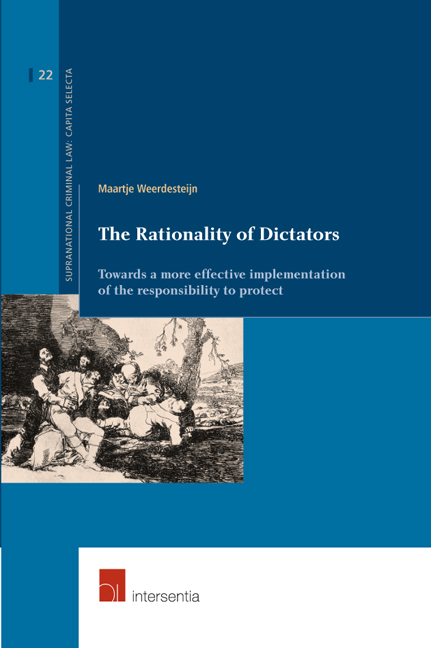 The Rationality of Dictators
The Rationality of Dictators from Part I - The Theory
Published online by Cambridge University Press: 28 September 2018
INTRODUCTION
After WWII, states were determined to prevent similar horrors in the future. In order to realize this, the prevention of interstate conflict, as well as the promotion of human rights and fundamental freedoms, became important goals of the United Nations. Tension, however, emerged between the promotion of human rights through the adoption of the Universal Declaration of Human Rights, which later led to the adoption of the International Covenant on Civil and Political Rights and the International Covenant on Economic, Social and Cultural Rights, and the Convention on the Prevention and Punishment of the Crime of Genocide, for instance, and a strict respect for state sovereignty that meant to ensure international peace and security. State sovereignty, as the foundation for the modern system of states, came to mean they were ‘legally equal to each other, not subject to the imposition of supranational authority, and, above all, not intervening in each other's internal affairs’ (Evans, 2008, p. 16). The manner in which countries have used sovereignty as an excuse not to intervene when horrendous crimes have been perpetrated or to hide behind it when they have perpetrated the crimes, has increasingly come to be seen as problematic (Cronin, 2007, p. 298).
Although Chapter VII of the UN Charter, authorizes the UN Security Council to intervene in order to ‘maintain or restore international peace and security’, for a long time this was defined restrictively and the Security Council was hesitant to interfere with state sovereignty. This frequently severely limited the possibilities to protect populations from human rights violations (Askin, 2005, p. 1723; Grünfeld, 1998). Furthermore, during the Cold War, the Security Council was largely deadlocked. The United States and the Soviet Union vetoed an astounding 279 resolutions, and dictators were largely able to act as they pleased within the confines of their own borders for years, often even while being backed by one of the two superpowers (Ayittey, 2011, pp. 107- 108; Boutros-Ghali, 1992). While the Security Council became much more proactive after the end of the Cold War, and increasingly came to see human rights violations as a genuine concern, there was a continuous failure to prevent genocides from happening (Grünfeld, 1998; Österdahl, 2005). The genocides that occurred in Rwanda and Srebrenica in particular, where UN peacekeepers were present but failed to intervene in an effective manner, caused international outcry (LeBor, 2006).
To save this book to your Kindle, first ensure [email protected] is added to your Approved Personal Document E-mail List under your Personal Document Settings on the Manage Your Content and Devices page of your Amazon account. Then enter the ‘name’ part of your Kindle email address below. Find out more about saving to your Kindle.
Note you can select to save to either the @free.kindle.com or @kindle.com variations. ‘@free.kindle.com’ emails are free but can only be saved to your device when it is connected to wi-fi. ‘@kindle.com’ emails can be delivered even when you are not connected to wi-fi, but note that service fees apply.
Find out more about the Kindle Personal Document Service.
To save content items to your account, please confirm that you agree to abide by our usage policies. If this is the first time you use this feature, you will be asked to authorise Cambridge Core to connect with your account. Find out more about saving content to Dropbox.
To save content items to your account, please confirm that you agree to abide by our usage policies. If this is the first time you use this feature, you will be asked to authorise Cambridge Core to connect with your account. Find out more about saving content to Google Drive.